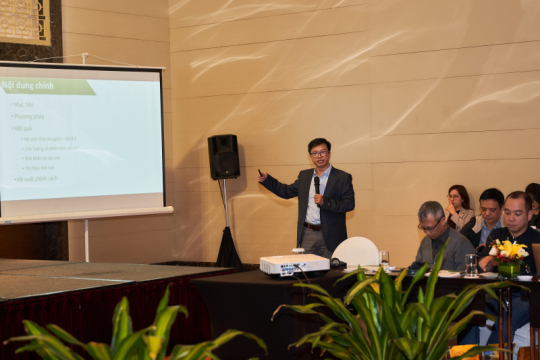Glass recycling rates in Vietnam remain alarmingly low, standing at a mere 15%, despite glass being a material that persists indefinitely in the environment if not recycled. This was the topic of a seminar titled Glass Recycling Activities in Vietnam on January 15.
"Without proper recycling, glass waste will continue to burden our environment indefinitely. Therefore, glass recycling initiatives require more attention," stated Mai Thanh Dung, Deputy Director of the Institute of Strategy and Policy on Natural Resources and Environment (Ministry of Natural Resources and Environment), at the seminar. It was organized by the Economy and Environment Partnership for Southeast Asia (EEPSEA), the host institution of EfD Vietnam.
Very little is recycled
EfD researcher Ho Quoc Thong who leads a research project on glass recycling presented a concerning report on the state of glass recycling in Vietnam. Currently, the recycling efforts are minimal and mostly done manually. Financial incentives are low with domestic glass collection costing between 2,250 to 2,500 VND/kg, while imported glass costs approximately 1,800 - 2,100 VND/kg. Additionally, domestic sources of recycled glass are not yet stable, which discourages domestic recycling activities. As a result, glass manufacturers prioritize imported recycled glass to ensure economic benefits.
Although glass manufacturers demand a significant amount of recycled glass scraps as raw materials, the infrastructure for collection and recycling needs to be developed. Vietnam requires a comprehensive glass waste collection system as many bottles are not disposed of correctly, resulting in environmental damage.
"Our survey data indicates that only 6% of scrap yards purchase used glass bottles. This low demand doesn’t motivate scrap collectors, bottle pickers, and waste collectors to gather and sell glass waste. Only 5% of scrap buyers purchase glass and 8% of waste collectors and bottle pickers collect glass waste," said Ho Quoc Thong.
A comprehensive approach is needed
Ho Quoc Thong suggested several strategic measures in his presentation to improve the management of glass waste. These measures include:
- Upgrading recycling infrastructure should prioritized to optimize the glass recycling process.
- Support should be given to vulnerable groups to ensure inclusivity within the glass waste management system.
- A comprehensive approach should be taken to promote efficient glass waste collection and recycling processes. This approach should involve legal tools, market tools, awareness campaigns, and behavioral education.
Government plays crucial role in driving positive change
The EEPSEA report recommends several ways to improve glass recycling processes. One suggestion is to integrate contribution indicators into Extended Producer Responsibility (EPR) regulations. Another is to provide financial support for domestic glass recyclers and manufacturers to encourage them to collect and recycle glass waste. Additionally, it is important to strengthen law enforcement related to waste violations and establish regulations on waste classification at the source.
Educational campaigns should also be organized to raise consumer awareness about responsible waste management and recycling. Finally, the government should set standards for eco-friendly packaging and encourage environmentally friendly packaging designs such as eco-friendly labels and easily recyclable glass bottles.
Businesses need time to adjust
Surveys from the industry show that businesses need time and resources to prepare and test various EPR compliance models. Large enterprises have already started piloting collection projects, but smaller businesses require additional time to prepare for EPR regulations.
"It may take manufacturers 3-6 months to assess the feasibility of different EPR options, especially due to the limited infrastructure and readiness of the recycling system. This presents an opportunity for enterprises or associations to experiment and pilot collection and recycling models," said Ho Quoc Thong.
To reduce the cost of glass waste collection, manufacturers should rely on the current solid waste collection and recycling ecosystem by encouraging waste collectors and buyers who already collect other recyclable materials like aluminum, plastics, and paper to collect glass waste as well.
The research team suggests that glass packaging manufacturers establish centralized collection systems at their main retail outlets, such as large bars, stores, and restaurants. Cooperative collaboration between various association members is required for this approach.
Manufacturers should also consider integrating Corporate Social Responsibility (CSR) projects and using environmental funds to support workers in the industry, who are often a disadvantaged group in society. This serves multiple purposes, such as improving glass waste recycling and enhancing community goodwill.

